When you buy through our links, we may earn an affiliate commission.
Many headphones are suitable for music production, but there are some headphones specifically made for mixing and mastering (this is what we'll focus on in this article). You'll want headphones that are made to capture details without distortion and are comfortable for long hours of use.
A couple of our favorite pairs are Sennheiser HD 280 Pro Closed-Back Studio headphones, great for reliable sound on a budget, and the Shure SRH1540 Closed-back Mastering Studio Headphones, for a studio-quality sound.
All-in-all, these over-ear headphones offer balanced sound and amazing audio quality for a great listening experience. Read on to see which headphones you won't go to the studio without.
Quick Summary of the Best Headphones for Mixing & Mastering
- Sennheiser HD 280 Pro Closed-Back Studio and Live Monitoring Headphones (Best Closed-Back Headphones Under $100)
- Audio-Technica ATH-M50x Closed-back Studio Monitoring Headphones (Runner-Up)
- Neumann NDH 30 Open-back Studio Headphones (A High-End Pair for Studio Use)
- Shure SRH1540 Closed-back Mastering Studio Headphones (Best Shure Headphones)
- AKG K712 Pro Open-back Mastering and Reference Headphones (A High-End Pair for Mastering)
- Beyerdynamic DT 770 Pro 80 ohm Closed-back Studio Mixing Headphones (Budget-Friendly Pair for Critical Listening)
- Sony MDR-7506 Closed-Back Professional Headphones (Best Sony Headphones)
Best Headphones for Mixing and Mastering
1. Best Closed Headphones Under $100 – Sennheiser HD 280 Pro Closed-Back Studio and Live Monitoring Headphones
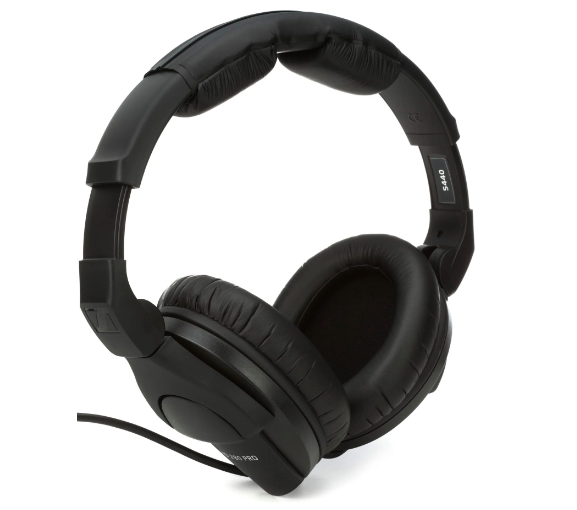
SPECS
- Ohms: 64
- Frequency Response: 8Hz-25kHz
- Open/Closed: Closed
Sennheiser can take all our money, seriously. They make some of the best microphones and headphones for music and film professionals. Their HD 280 headphones are the gold standard for affordable, quality headphones for mixing and mastering.
They're super accurate, thanks to the closed design and frequency response. They have a maximum sound pressure of 113dB, making them great for loud music without distortion.
You can use these for studios and gigs, even if it's a noisy environment. Studio recording pros are big fans of how well-balanced they are and say they are clear and crisp.
Another reason why these mastering headphones have so many fans is because of the reasonable price point. They're affordable and come from a well-respected brand.
2. Runner-Up – Audio-Technica ATH-M50x Closed-back Studio Monitoring Headphones
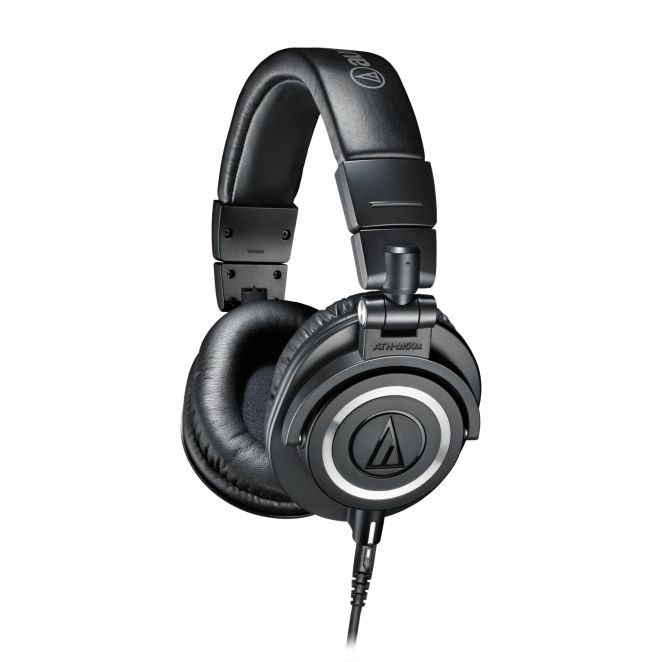
SPECS
- Ohms: 38 Ohms
- Frequency Response: 15Hz-28kHz
- Open/Closed: Closed
Audio Technica makes some fantastic headphones for DJs, musicians, producers, and music lovers. This specific model is very popular for studio tracking and mixing, DJ monitoring, and leisure.
The closed-back headphones isolate sound and prevent leakage, so if you work in noisy environments you're going to love these. The collapsible headphones can handle moderate to loud audio as well, they have a max sound pressure level of 99dB.
The headphones include 3 detachable cables, including a coiled, straight, and a shorter straight cable with an in-line remote and mic.
Audio engineers love the frequency range (15Hz-28kHz) because of the deep, accurate bass response.
3. A High-End Pair for Studio Use – Neumann NDH 30 Open-back Studio Headphones
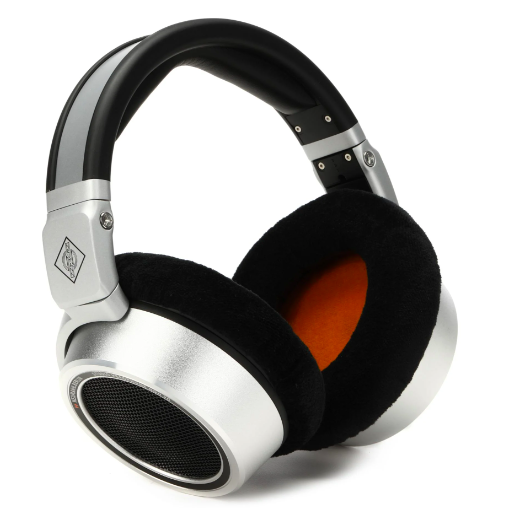
SPECS
- Ohms: 120
- Frequency Response: 12Hz-34kHz
- Open/Closed: Open
Neumann is another top-rated brand that delivers precise detail for mixing music. If you can stretch your budget, consider the NDH 30 headphones. They're a good pair for checking the upper and lower extremes of the audio band.
It has a perfectly flat frequency for accurate sound, giving you the best quality for your mixes. Overall, they're everything you could want for high-precision monitoring.
They come with a detachable, internally balanced cable and a 1/4-inch adapter and are lightweight (.077 lbs), making the easy to transport. You'll wear these for hours without the constant "on-and-off" breaks. The memory foam ear pads are top-tier for preventing ear fatigue.
You'll love how you can hear vocals with these headphones, even when singing. That's something to consider if you're torn between open or closed-back headphones!
4. Best Shure Headphones – Shure SRH1540 Closed-back Mastering Studio Headphones
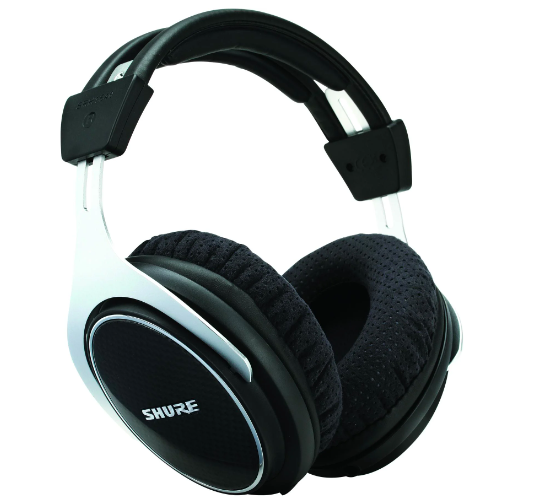
SPECS
- Ohms: 46 Ohms
- Frequency Response: 5Hz-25kHz
- Open/Closed: Closed
Shure mics and headphones are loved by singer-songwriters, podcasters, public speakers, and just about everyone who has ever used their audio equipment. If you're considering Shure headphones, be sure to check out the SRH1540 closed-back headphones.
They're perfect for monitoring, mastering, and critical listening and have breathtaking accuracy and rich bass.
They're super comfy (you can adjust the headband and there are foam ear pads). You'll love the quality construction of these headphones, they are built to last and don't feel cheap. And you can wear them for hours and not get uncomfortable!
5. A High-End Pair for Mastering – AKG K712 Pro Open-back Mastering and Reference Headphones
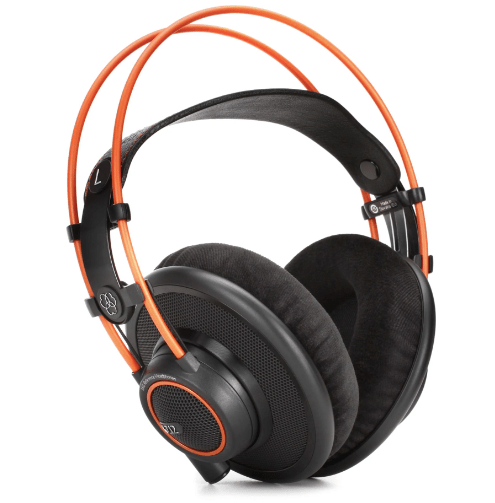
SPECS
- Ohms: 62 Ohms
- Frequency Response: 10Hz-39.8kHz
- Open/Closed: Open
AKG headphones are the best pair of high-end headphones built for accuracy -- whether you're mixing or mastering, these open-back headphones are perfect. They have a frequency response of 10Hz-39.8kHz, which is pretty impressive!
This high-quality pair comes with an XLR connector and an additional coiled cable and a premium carrying bag. They are comfy for long sessions, which is a major perk for those who work in the industry full-time.
These open-back headphones are great for a natural listening experience. These are the best pick for true music production professionals - there are so many details you'll hear and you may not know where to start. Sounds like a good problem to have! Definitely consider these if you're a music producer.
Want to Learn More About Open Back Headphones? See the Best Open Back Headphones Here
6. A Budget Pair for Critical Listening – Beyerdynamic DT 770 Pro 80 ohm Closed-back Studio Mixing Headphones
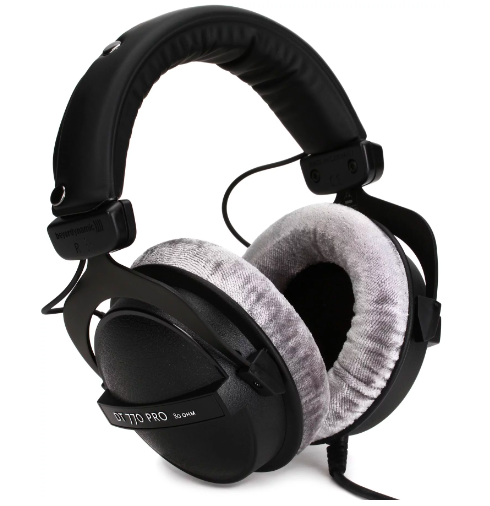
SPECS
- Ohms: 80 Ohms
- Frequency Response: 5Hz-35kHz
- Open/Closed: Closed
These closed-back mixing headphones from Beyerdynamic have great noise isolation and feature a frequency response range of 5Hz to 35kHz. That's a pretty wide range of frequencies, and usually, 20 kHz is all you need for sound accuracy.
The high-quality headphones come with a detachable cable that is replaceable, and it has a 3.5mm jack and a 6.35mm adapter for connectivity with your devices. Users make sure to give it an added star for its comfort.
They have padded ear cups with soft velour and an adjustable headband that is also padded. Drummers love them, and they're great for casual listening.
All parts are replaceable, which is rare in many electronics and gear these days. Having serviceable gear is ideal for greater longevity.
Want to Learn More About Headphones? See the Best Headphones for Drumming Here
7. Best Sony Headphones – Sony MDR-7506 Closed-Back Professional Headphones
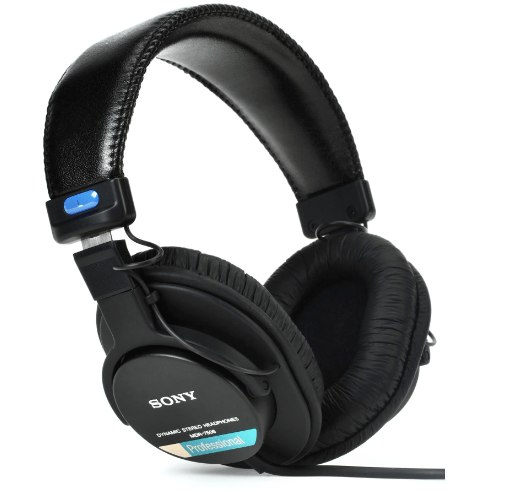
SPECS
- Ohms: 62 Ohms
- Frequency Response: 10Hz-20kHz
- Open/Closed: Closed
Sony has a quality pair of headphones under $100, perfect for focused listening. Whether you're tracking our mixing, they'll offer impressive sound isolation. The closed-back design and thick earcups will keep sound from leaking out.
Sony takes pride in their quality construction and says that the headphones can easily withstand the abuse of daily wear. We still recommend a headphone stand or case, but these headphones will last a long time.
These headphones are getting love for their flat response, and if you are a drummers or bass players you'll love them for tracking.
Best Headphones for Mixing & Mastering Buyer's Guide
Mixing and mastering is a complex task, and no surprise - so is choosing the best headphones to help you master like a pro.
Don't worry, we've created an easy-to-follow guide going over the important points to consider when shopping for a pair of headphones to use for your mixing and mastering needs.
Here are the important things to consider...
Frequency Response
Frequency response refers to the range of frequencies headphones can accurately reproduce. A flat frequency is best, so you can hear the audio exactly as it was recorded. If the frequency is uneven the audio won't be accurate and will not have great sound.
A frequency response between 20Hz to 20kHZ is pretty standard in most mixing and mastering headphones, but always double-check that the frequency response will meet these requirements.
Impedance
Impedance refers to how much power is needed to drive the headphones. 80 ohms is great for mixing and mastering music at a professional level, but it's a preference as well. Low-ohm headphones can sound good with laptops but high-ohm headphones require more power to drive. Professionals will likely pick high-ohm monitor headphones for crisp sound.
Sensitivity
Sensitivity is how loud the headphones are at a given power level. 100dB or higher is what you'll want to look for. 110dB may be too loud, and going below 100dB may be too quiet and could require a headphone amplifier.
Closed Versus Open Back
Closed-back professional studio headphones help with isolation so you can focus on the music. Open-back headphones will suffice, but may not be the best pick if you work in a noisy environment or have had problems with external noise in the past.
Comfort
Some headphones aren't that comfy. Make sure the headphones have an adjustable headband and ear cushions. Highly not likely that you'll be lying down as you work, but some headphones are not comfy for leisure.
Price
Your first pair of mixing headphones might be $100 but as you advance into the work you may pay closer to $500 or $1,000 for a pair of headphones for better sound quality. It's all preference, though.
Just note that industry standard typically does mean more expensive.
Frequently Asked Questions (FAQs)
What is the frequency range of mixing headphones?
20Hz to 20kHz, this is the range of frequencies humans can hear.
Open back versus closed back: Which one is better for mixing and mastering?
Closed Pros:
Since the ear cup design is sealed, the sound is contained in the cups to block outside noise. Focused sound is great for listening to details.
Closed Cons:
They can be a little uncomfy after long hours of use.
Open Back-Pros:
They're great for hearing vocals and are typically more comfortable.
Open-Back Cons:
They're vented, which means there can be sound leakage. Closed headphones are preferred for those who need as much isolation as possible.
How does impedance affect headphones?
If the impedance is too high, they can't draw enough power from a device. If it's too low, they can draw too much power and cause distortion. 32-300 ohms is your best bet.
Verdict
So there you have it. The best headphones for mixing and mastering. These picks offer great sound, but which ones do you go with?
Sennheiser HD 280 Pro Closed-Back Studio and Live Monitoring Headphones are a tried and true option under $100, but if you can stretch your budget and go with a more "high-end" pair, consider the Shure SRH1540 Closed-back Mastering Studio Headphones.
Each pair will vary by ohms, included features, frequency response, and use. Some will be a bit better for mastering, and some will sound better for mixing, but headphones that offer the best of both worlds are worth investing in.
If you can, consider buying the AKG K712 Pro Open-back Mastering and Reference Headphones for $639.
Photo Courtesy Sweetwater
